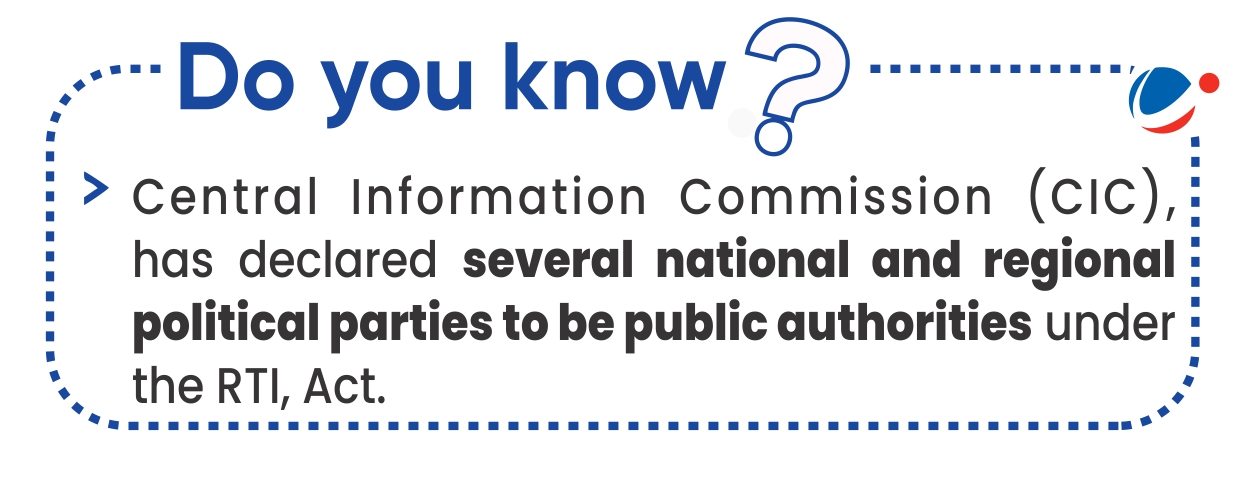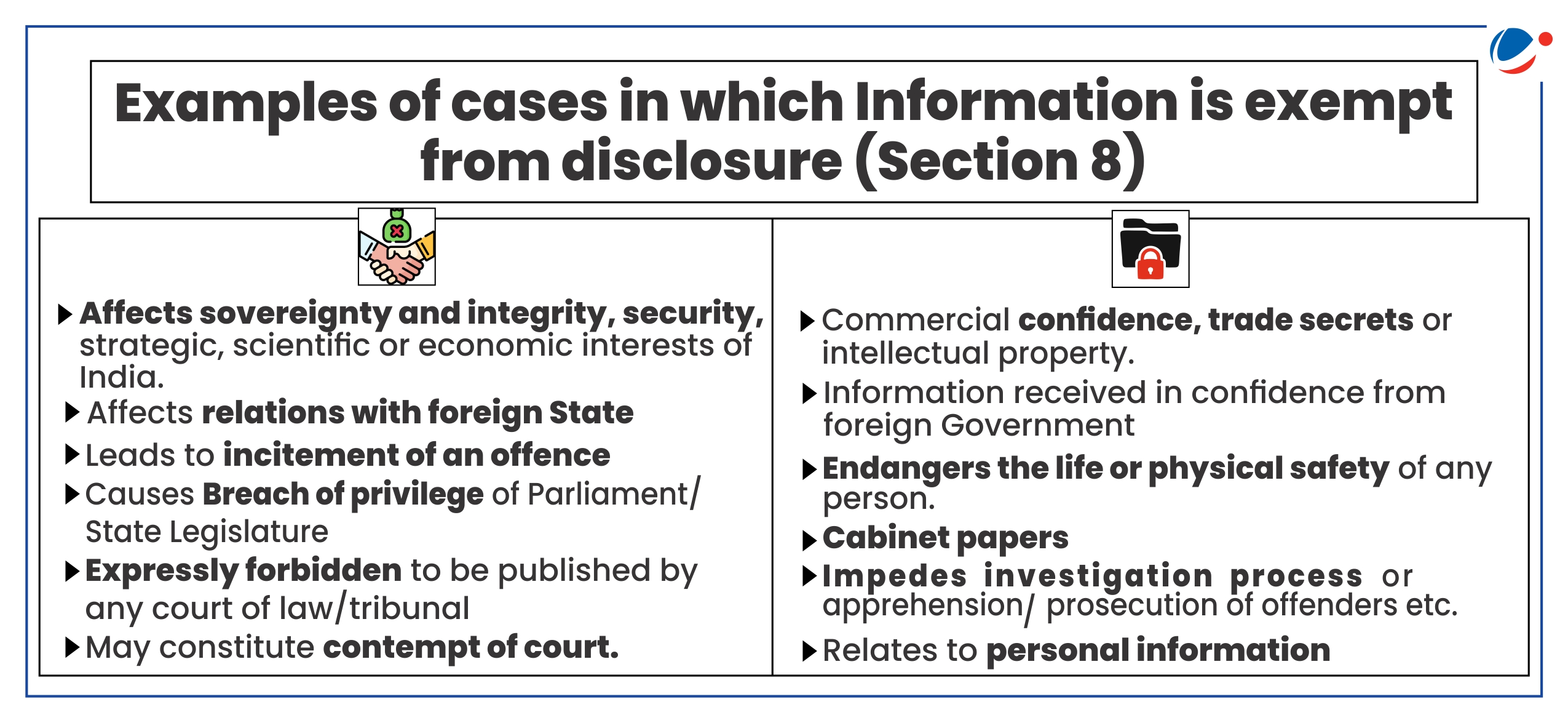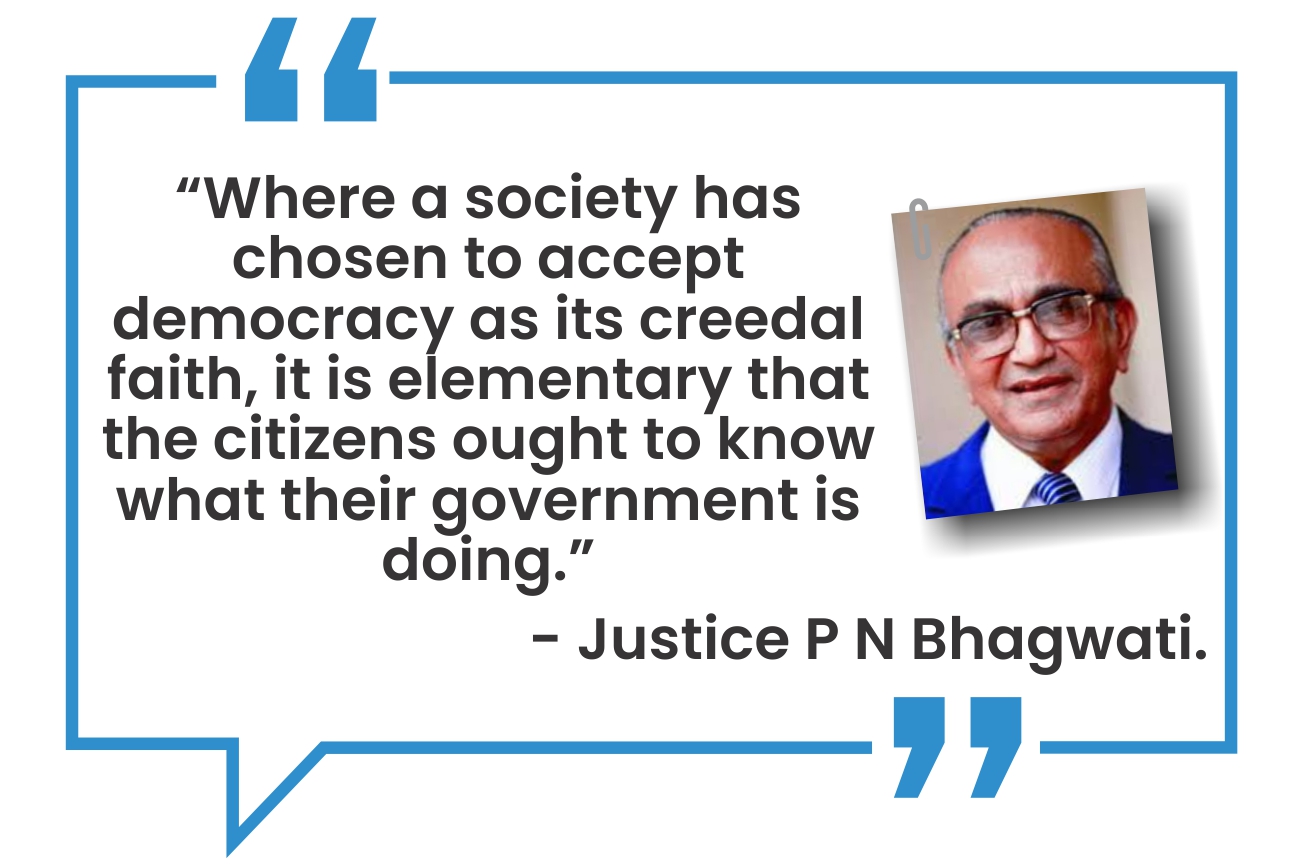Why in the News?
As the Right to Information (RTI) Act, 2005 approaches its 20th anniversary in 2025, it is crucial to reflect on its impact and the challenges it faces.
About RTI Act, 2005
- It was enacted in June 2005 and came into force in October 2005.
- The act provides citizens the right to secure access to information under control of Public Authorities (PAs).
- Coordinating agency: Department of Personnel and Training under Ministry of Personnel, Public Grievances and Pensions (MoPPG&P).
- Background:
- Right to Information finds articulation as a human right in the Universal Declaration of Human Rights, the International Covenant on Civil and Political Rights and the International Covenant on Economic, Social and Cultural Rights.
- India enacted the "Freedom of Information Act, 2002" in order to promote, transparency and accountability in administration.
- Later, RTI Act 2005 replaced the Freedom of Information Act, 2002.
- 'Raj Narayan v/s Uttar Pradesh Government': Supreme Court established the Right to information as a fundamental right under the Article 19 of Indian Constitution.
Key Provisions of the RTI Act

- Institutional framework:
- Central and State Information Commissions: to oversee its implementation and address appeals regarding non-disclosure of information.
- Central Public Information Officers (PIO) or State PIO: in every public authority to provide information to persons requesting for the information under this Act.
- Rights provided:
- Every citizen has the right to request information from a public authority.
- Obligations of Public Authorities (Section 4): To maintain records and proactively disclose certain categories of information to minimize the need for formal requests.
- Applicability: Public Authorities, including all authorities/bodies/institutions of Government established under the Constitution, any other law made by the Parliament or a State Legislature or through notification issued/order made by the appropriate Government.
- It also includes bodies owned, controlled or substantially financed by the Central/State Government and non-Government organisations substantially financed (directly/indirectly) by the Central/State Government also fall within the definition of public authority.
- Exemptions from Disclosure:
- Section 8: Certain information is exempt from disclosure (see infographic).
- Certain intelligence and security organisations specified in the Second Schedule: Includes 27 organizations like Computer Emergency Response Team (CERT-In), Intelligence Bureau, Research and Analysis Wing, Directorate of Enforcement, National Technical Research Organisation etc.

- Jurisdictions: Lower courts are barred from entertaining suits or applications.
- However, the writ jurisdiction of the Supreme Court and high courts under Articles 32 and 225 of the Constitution remains unaffected.
- Other key Provisions:
- Penalties: In case of failure to provide information on time, incorrect, incomplete etc.
- Time Frame for Providing Information: Within 30 days of the request; for matters concerning life or liberty, it must be provided within 48 hours.
- Appeals: Citizens can appeal against decisions of PIOs if their requests are denied or inadequately addressed.
- Amendments:
- Right to Information (Amendment) Act, 2019 modified the terms and conditions of employment for the Information Commissioners (ICs) at the Central and State Levels.
- It empowered the Central Government to prescribe the Terms, Salaries, Allowances and Other terms of service of Chief ICs and ICs (at the central and state level).
- Digital Personal Data Protection (DPDP) Act, 2023: Amended section 8(1)(j) of RTI law to exempt all personal information from disclosure.
- Right to Information (Amendment) Act, 2019 modified the terms and conditions of employment for the Information Commissioners (ICs) at the Central and State Levels.
Significance of Right to Information

- Empowerment of Citizens: RTI Act empowers citizens to actively participate in the democratic process by providing them with the means to access information about government activities, policies, and decisions.
- Transparency: Proactive disclosure of important information (Sec 4) by governmental agencies constitutes the essence of transparency in governance.
- Accountability: Public authorities are required to justify their actions and decisions when requested by the public.
- Expose Corruption: RTI Act was used to uncover the illegal allotment of apartments in the Adarsh Housing Society.
- Effective Implementation of Policies and Welfare Schemes: In Rajasthan, RTI was used to expose discrepancies in MGNREGA records.
Challenges in implementation of RTI Act
- Functional Issues: As per 2023-24 report of the Satark Nagrik Sangathan.
- Defunct ICs and vacancies: 7 out of 29 information commissions were defunct between July 2023 to June 2024.
- 9 commissions were without a chief information commissioner.
- Inordinate delays: 14 commissions would take 1 year or more to dispose a matter.
- Backlogs:Over 4 lakh appeals and complaints are pending across 29 information commissions across India (June 2024).
- Also, 42% of the appeals/complaints received by the CIC were returned.
- Skewed gender composition: Since the passage of the RTI Act in 2005, merely 9% of all information commissioners across the country have been women.
- Defunct ICs and vacancies: 7 out of 29 information commissions were defunct between July 2023 to June 2024.
- Structural Issues:
- Exemptions: RTI laws often include exemptions for certain types of information, such as national security or personal privacy which are open to interpretation.
- Authorities lying outside 'Public Authority' definition: For instance, PM CARES Fund is not a "public authority" under RTI Act, 2005.
- Dilution through amendments: For instance, RTI (Amendment) Act, 2019 may impact the independent functioning of ICs.
- Procedural Issues:
- Bureaucratic Resistance: Public officials may be reluctant to disclose information that could expose wrongdoing, inefficiency, or corruption within their own departments.
- Non-Compliance: Political parties haven't appointed information officers, Act stating they are not public authorities.
- Lack of Awareness and Education: It can lead to underutilization of RTI.
- Other issues: Lack of protection of RTI activists; Inadequate training of PIOs; COntradition with Official Secrets Act, 1923 etc.
Way Forward
- Recommendations of 2nd ARC in its report entitled, "Right to Information – Master Key to Good Governance:
- Establish National Coordination Committee (NCC): As a national platform for effective implementation of the Act via monitoring the functioning of the national portal for RTI, carrying out impact evaluation of the implementation of the Act etc.
- Awareness campaigns: Can be entrusted to credible non-profit organizations at the State level.
- Recruitment of adequate staff: In the public authorities for proper functioning of RTI.
- Proper record keeping by experts: So that information can be retrieved as per the requirement of the information seekers.
- Other steps: Separate chapter, "Protection of those seeking information under the (RTI) Act"; Rigorous RTI training to government officials, Digitisation of Records etc.




